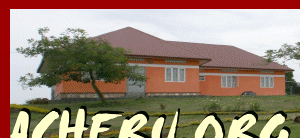|
|
| September
2016 report |
| I hope you have all seen the new Acheru film. I think it shows very clearly the impact of the work done by Acheru. We were not involved in producing the film, though I had previously urged the Acheru staff to consider making a film to help with promotion of the work and I am very encouraged by the result. We've already had a very positive response from people who have watched it, but there is something I would like to clarify before it causes confusion. A figure of 96,000 disabled children treated over the whole of Uganda doesn't just refer to Acheru! This is the total dealt with by all organisations; we are part of a nationwide network dealing with disabled children, coordinated through CoRSU, where we send our surgical referrals. In cooperation with CoRSU we have our own extensive catchment area in Mukono district, and also around Minakulu in northern Uganda. This however doesn't limit the work, people are free to bring their children where they wish for treatment, and it's a tribute to the reputation of Acheru, built on the quality of care and the life changing outcomes, that we get children from all over Uganda and beyond, so our influence is far reaching. |
| Last month, instead of writing an update I used a number of before and after photos of Acheru children to illustrate what can be done. The pictures showed the physical changes but there is much more to it than that. Through treatment at Acheru a child's life can be transformed in a very short time, and this can mean a big adjustment for the child and for their family so there is an important psychological element to our work. |
| Sometimes it is straightforward, the result of treatment being joyful for everyone, a life transformed, normality restored, and all concerned get on with their lives. For others it is different. It can be very difficult for a child to adjust to a dramatic change. Perhaps disabled from birth, they were used to life as it was with all its limitations. We've known children so used to their disability that they'd ceased to be self conscious about it, but following treatment or surgery they can suddenly be very self conscious about their appearance. A disabled child tends to think more of the limitations on what they can do rather than appearance. Following treatment they are delighted to suddenly be enabled to do what other children can do, and the self consciousness about their changed appearance comes as a shock. |
| There are other problems to deal with too. In bringing a child to Acheru a family may have set themselves against the advice of elders, traditional healers, or witchdoctors who often resist treatment, believing the child's condition was meant to be, and opposing any intervention. This even though the disability could be seen as a curse, with stigma and isolation for the child and the family. A consequence of such attitudes is that it can be a long time before a child is brought to us, and their condition can have been made worse and their suffering prolonged, by either neglect or misguided attempts at treatment. For many there can also be the difficulty of bringing a child to a unit like Acheru with a strong Christian ethos. Sadly we've even seen disabled children used for begging, with any kind of intervention resisted because successful treatment would mean a loss of income. |
| All of this places demands on the staff; the counselling and follow up needed after treatment, as well as the work which goes into persuading families to bring children to Acheru. Much of this is unseen, going on in the community as well as at Acheru. In the community Harriet, along with our social worker Rose, provides psychosocial support, but in the unit others help too with the nurses, physiotherapist and orthopaedic officer providing counselling as the children are rehabilitated. |
| Successfully treated children returning to their communities can have a big influence in convincing others to come to Acheru. It says much about the work of everyone involved that the outcomes are usually so positive. |
| Brian Dorman |
|
|
|



